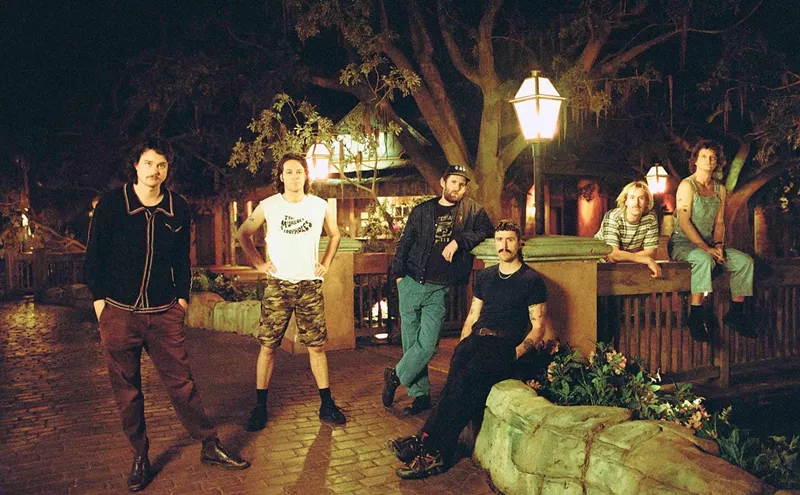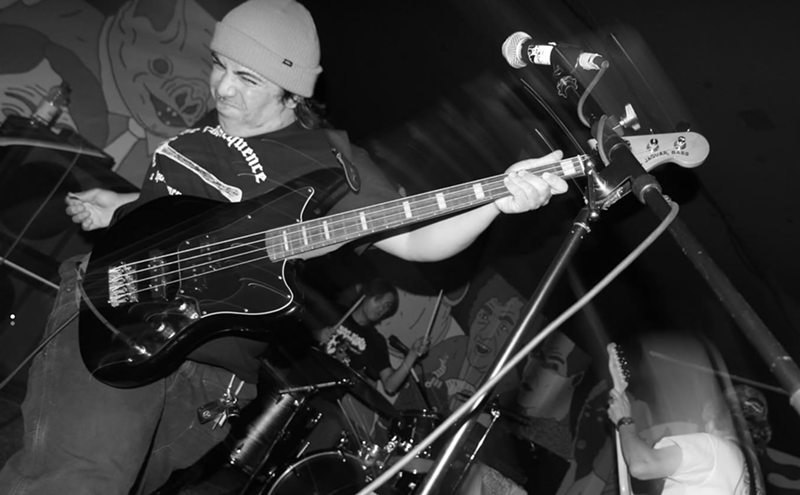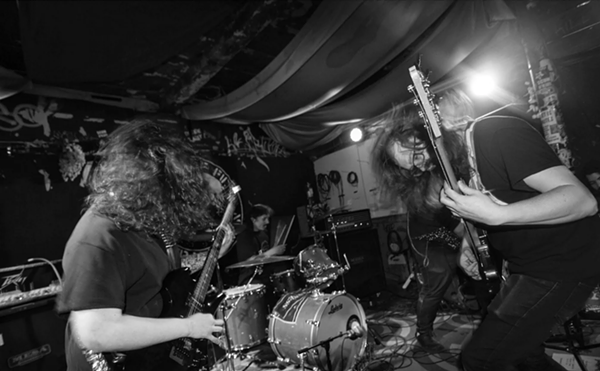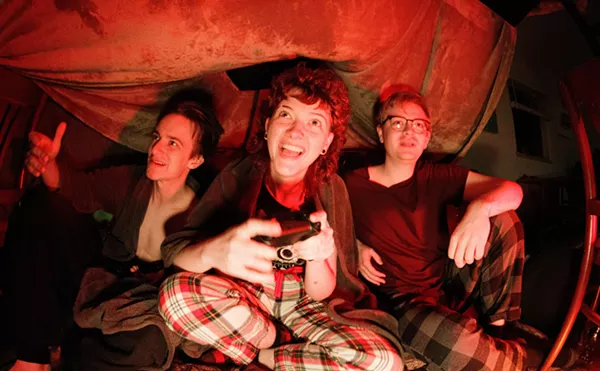Garofalo certainly isn't wanting for employment these days. She has three films awaiting release -- Big Trouble, a sprawling road comedy by director Barry Sonnenfeld (Men in Black) in which she plays a small role, as well as Wet Hot American Summer and The Search for John Gissing, a pair of indie flicks that give her considerably more to do -- and she'll make another movie, writer/director Sam Seder's digital opus A Bad Situationist, before summer fades. She's also involved in The Laramie Project, an HBO adaptation of an ambitious play revolving around the 1998 murder of Matthew Shepard, a gay student at the University of Wyoming, that's being partly filmed in Denver; like several of her fellow castmembers, Garofalo, who plays Catherine Connolly, a lesbian professor at the university, is donating her salary for the project to anti-hate-crime organizations. Plus, she's headlining a stand-up tour. Her main reason for doing so, she says, is because "it's creatively fulfilling. There's interaction with a live audience, and I'm responsible for the outcome of it, whether it's good or bad. I write it, I say it, and I can show up looking any way I want."
Nonetheless, Garofalo remains a cult figure, in large part because she's not interested in being anyone other than her consistently hilarious, frequently cranky, invariably honest self. And as she makes clear below, she's not expecting that status to change.
WW: A lot of us out here believe the world would be a better place if you were the biggest star in show business...
JG: Oh, you old so-and-so!
WW: Do you agree with that?
JG: No!
WW: So would your becoming the biggest star in show business make the world infinitely worse?
JG: I'm not saying that. But what's funny about that is, it's such a teeny-weeny segment of the population that thinks that -- and they're usually people who are so similar to me that what they're really saying is, "It would be so much better if I was the biggest star in show business..."
WW: Maybe so. But the fact is, nobody is putting up Web sites in honor of us, but there are all kinds of Janeane Garofalo worship sites on the Internet right now. Does it make you uncomfortable or self-conscious to know that there are people out there who may be looking at you as a role model?
JG: I don't see those sites, so I don't really think about them until someone says, "I saw them." I find them flattering, I suppose, but they're also so interesting to me, because I'm so filled with insecurities and self-doubt, like anybody, and self-loathing, like anybody. So when I hear about them, it seems so strange. And it almost serves to amplify my self-doubt. It's like, "I can't believe that someone out there actually likes me, because I dislike me so much."
WW: Hollywood executives obviously don't, because you're working all the time. But it's frustrating for fans, since the decision-makers don't seem to have any idea how to bring out the best in you; they just try to hammer you into pigeonholes. It's as if they're saying, "She's got something really special. Let's make her play a worn-out stereotype." Is that something you run into on a fairly regular basis?
JG: No, because I don't think mainstream entertainment perceives me as special. It probably perceives me as neither here nor there.
WW: And yet you've starred in some big-studio movies, like [1996's] The Truth About Cats & Dogs. But when fans went to see it, hoping the people making it would let you put your stamp on it, they discovered that it's a very cookie-cutter kind of film.
JG: Yeah, right. I love the woman who wrote that -- Audrey Wells, who's a good friend of mine and a talented woman. But the point is, that's a commercial, mainstream movie, and to think anything otherwise is the mistake of the ticket buyer. I mean, that's a very saccharine movie that I don't love; I'm not a big fan of The Truth About Cats & Dogs. I did the best I could to not be cookie-cutter within a cookie-cutter thing, but you know what? The studio will squish you. They'll sit on you. They will literally sit on you until you say "Uncle," and you feel like, "Fine, I'll do it your way." Because mainstream moviemaking is not an actor's medium. It's just not. It's a director's medium, it's a studio medium. If you really want to do good work, then get the fuck out of Hollywood -- it's that simple. And that's why when people complain about it, I don't really understand what they're complaining about. If you don't see that when you align yourself with something like The Truth About Cats & Dogs, which is being made by a big studio with a big budget, then you're not really opening your eyes to it.
WW: Then why do you still work in mainstream movies? Is it because small parts allow you to fly under the radar to some degree?
JG: Well, it's not like I have the opportunity to do lead roles in big, commercial films; those are very few and far between. But the thing is, all these other independent things I do, I don't get paid for them, really. But what I can do is, every once in a while do something in a mainstream movie -- and get paid! Which is great. And also, I feel like, damn it, I'm going to try and be in these commercial films as a woman who's proudly 36 years old and proudly not physically fit. That is my political statement, and that's how fucked up our culture is -- that just aging and expanding as a woman is a political statement at this point. And if I can be in a commercial film looking not cookie-cutter, or not trying to behave in a cookie-cutter manner, then I have accomplished something. At the end of the day, what have I accomplished? Who the fuck knows. Probably not all that much. But if I was an audience-goer and I had to look at another anorexic, I think I'd shoot myself. I can't take it. I can't take the blown-dry, stick-straight hair and the six-pack abs -- this is both guys and girls. It takes me out of the story. I don't believe in it. I don't believe the characters are really telling me the truth.
WW: At the same time, you talked very openly about having breast-reduction surgery in Marie Claire last year...
JG: That was something I did in college, long before I was in the public eye, and I did it because I personally was very uncomfortable -- because I'm 5'1" and, for whatever reason, I had huge boobs. My sister, too; we're all built like my grandma. And when you're small with big boobs, you get a lot of very disconcerting attention. So that was my choice as a person that had nothing to do with working the sex angle at all, which I've never, ever done. It was more like, I got these boobs in sixth grade and I've had enough, and insurance will pay to get rid of them. Now, since then, I have lost a lot of weight a couple of times. I've thought, I'm going to try it. Fuck it. I'm tired of being the only person fighting the good fight here. I'm sick of losing role after role. Fine, I'll lose this weight. But I refuse to do it healthily, and I wind up feeling like I'm not clear-headed at all, and I'll literally go off the diet the second I reach that goal. And one of those times was when I was on the cover of Marie Claire.
WW: You weren't happy about how that turned out, were you?
JG: I only did it under pressure to promote this movie, Steal This Movie, which is the Abbie Hoffman story and a movie I totally believed in. And it was very hard to get any publicity for that film, because no one was interested -- so when I was offered the opportunity to be on the cover of a fashion magazine, I did it. But it just looked stupid. It didn't even look like me. And also I was really skinny, which isn't me. So not only was I airbrushed, but I was much thinner than I need to be, or I care to be -- and I just didn't want to be on the cover of a fashion magazine, or even within the covers of a fashion magazine. And that's not going to happen again. It's not like people are asking me to be on the cover of anything. But you always get offers to be inside a magazine, and I just don't believe in fashion magazines, in the same way that I don't believe in magazines like Maxim and Gear, which are disguised as legit magazines but are really softcore porn.
WW: Magazines for guys who want to feel a little less weird than they would if they were buying Penthouse.
JG: Exactly. It's the gentleman's porn. It's the thinking man's porn.
WW: But being in a music magazine would be fine?
JG: Of course. I love music. Going to see live music is one of my favorite things to do -- and I'll go see bands without knowing anything about them, other than maybe reading a couple of reviews. You know, if someone writes, "This band reminds me of XTC circa Big Express," I'll be like, "That sounds right up my alley."
WW: What have you been listening to lately?
JG: I am a huge fanatic right now for Badly Drawn Boy, and doves, and Idlewild, and At the Drive In -- and I love the new Weezer CD. In my opinion, it's not as good as their best stuff. Lyrically, I think it's a little weak. But I love the tunes. It's a very catchy album. I guess that's what's been on maximum rotation. But a big emphasis on Badly Drawn Boy.
WW: Very interesting choices. Have you ever thought of becoming a music critic?
JG: Maybe if the comedy thing doesn't work out...












